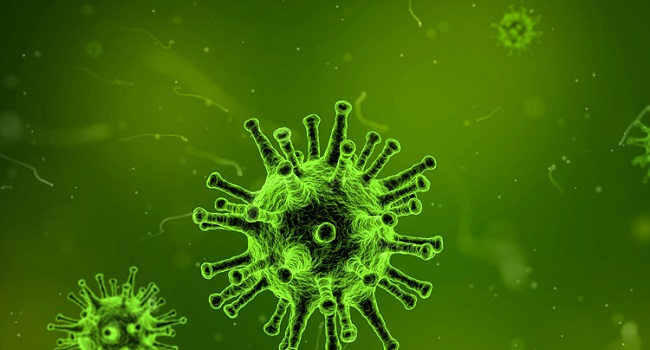- Latest news▼
-
00:37, July 3 Innovative way of diagnosing pancreatic cancer is developed

-
10:37, July 2 Mongolia health ministry informs about high risk of bubonic plague in 15 provinces

-
08:41, July 2 Rectal cancer disappeared in all patients in trial of new immunotherapy method, study finds

-
00:51, July 2 Hair started growing in man's throat: Doctors say it's because of smoking

-
20:02, July 1 Russian scientists create fast way to diagnose Alzheimer's disease

-
10:53, July 1 501 cases of measles infection registered in Armenia

-
08:29, July 1 Scientists have developed a monoclonal antibody to fight the deadly Nipah virus

-
11:29, June 28 Kobayashi Pharmaceutical investigating 76 more deaths linked to biologically active supplements

-
08:23, June 28 Children ages 5 to 12 are more likely to get concussions during recreation and other non-sports activities - study

-
18:20, June 27 Depression in adolescents linked to increased risk of cardiovascular disease - study

-
16:38, June 27 Nature Aging: experimental drug rejuvenated the livers of old and sick mice

-
14:55, June 27 Lancet: hypertension may be a major avoidable risk factor for dementia

-
08:43, June 27 Women with heart disease less likely to have concomitant problems corrected during surgery - study

-
22:22, June 26 Environment International: Children who spend more time in nature are mentally healthier, study suggests

-
13:58, June 26 Armenia addiction treatment national center director: 210 patients with drug addiction received treatment in 2023

All materials
Scientists have developed a monoclonal antibody to fight the deadly Nipah virus

Scientists have developed an experimental monoclonal antibody to combat the deadly Nipah virus, a new zoonotic pathogen with a staggering 90% mortality rate in humans.
The monoclonal antibody was developed as part of a collaborative research project between a San Diego-based biopharmaceutical company and several U.S. academic centers that study the deadliest new viruses.
"There are no licensed vaccines or treatments for patients infected with Nipah virus," writes Dr. Larry Zeitlin, co-founder of Mapp Biopharmaceutical in San Diego and lead author of the new study published in Science Translational Medicine. - "Nipah virus is a highly pathogenic zoonotic paramyxovirus that causes regular outbreaks among humans and animals in South and Southeast Asia.
Like Ebolavirus, SARS, SARS-CoV-2 and Marburg virus, the Nipah pathogen originated in bats.
The name "Nipah" comes from the name of a village in Malaysia where pig farmers were infected in the late 1990s.
Measles virus, although not of bat origin, is another member of the paramyxovirus family and is considered one of the most contagious viruses known to science. Although less contagious than measles, Nipah is capable of causing much higher mortality rates.
People infected with the Nipah virus can suffer from dangerous respiratory disorders and brain swelling, symptoms that lead to an unusually high mortality rate. Mortality rates range from 40% to 90%. The virus has been responsible for several relatively recent outbreaks in Bangladesh and India.
Before the new study, Zeitlin and colleagues developed a monoclonal antibody they called m102.4.
It has the ability to neutralize Nipah virus and is sometimes administered to patients under gentler protocols.
Now Zeitlin and colleagues have developed an improved monoclonal antibody called hu1F5, which targets the pre-malignant form of protein F of the Nipah virus.
The scientists tested the new monoclonal antibody in animal models.
In hamsters, the team found that administration of hu1F5 one day after infection resulted in 100% survival.
Importantly, hu1F5 also protected African green monkeys from Nipah virus, even when administered as early as five days after infection.
In this phase of the study, all six infected animals survived. Hu1F5 also outperformed the m102.4 monoclonal antibody produced earlier, which protected only one of the six treated animals from death.
The team of scientists also made several mutations to the antibody to extend its half-life, and reported that the monoclonal antibody, which showed superior results in animal testing, is moving on to phase 1 clinical trials in humans.
Follow NEWS.am Medicine on Facebook and Twitter
- Most read
month
week
day
- Nature Aging: experimental drug rejuvenated the livers of old and sick mice 1470
- Depression in adolescents linked to increased risk of cardiovascular disease - study 1449
- Environment International: Children who spend more time in nature are mentally healthier, study suggests 1447
- Lancet: hypertension may be a major avoidable risk factor for dementia 1424
- Women with heart disease less likely to have concomitant problems corrected during surgery - study 1412
- Children ages 5 to 12 are more likely to get concussions during recreation and other non-sports activities - study 1261
- Kobayashi Pharmaceutical investigating 76 more deaths linked to biologically active supplements 1259
- Russian scientists create fast way to diagnose Alzheimer's disease 632
- Scientists have developed a monoclonal antibody to fight the deadly Nipah virus 615
- 501 cases of measles infection registered in Armenia 603
- Rectal cancer disappeared in all patients in trial of new immunotherapy method, study finds 520
- Hair started growing in man's throat: Doctors say it's because of smoking 494
- Mongolia health ministry informs about high risk of bubonic plague in 15 provinces 438
- Innovative way of diagnosing pancreatic cancer is developed 185
- Find us on Facebook
- Poll





